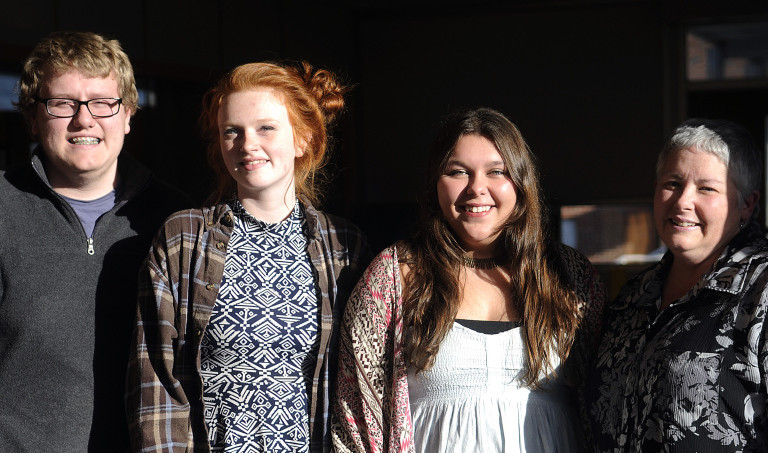GARDINER — In the middle of all the typical concerns of high schoolers, one in particular stands out for a group of Gardiner Area High School students.
Jillian Moore, 18, Joshua Mathews, 17, and Melanie Mansir, 16, and the other members of the school’s Civil Rights Team see how economic inequities affect their fellow students.
This fall, the team has suggested a change to School Administrative District 11’s harassment policy to include socioeconomic bias.
“There’s not enough awareness that there’s a problem,” Moore said.
Generally speaking, socioeconomic status is a person’s standing in a community or society based on income, education and occupation.
In their presentation to the SAD 11 school board and a subcommittee, team members distilled their concern into a PowerPoint presentation. Harassment based on socioeconomic status occurs when a student is targeted for not having a cellphone or for getting a free or reduced-price lunch or wearing clothes that come from discount department stores.
Their concern, they said, is ensuring a safe environment for learning. When students are being harassed based on their socioeconomic status, they say, those students may be distracted and not able to perform to the best of their abilities in their classes. While team members do acknowledge the district has a strong harassment policy, they are concerned it lacks consideration of socioeconomic status.
They bolster their position with data on the lunch program — 44 percent of district students and 40 percent of high school students are eligible for free and reduced-price lunch. The justification they offer to support their effort is Section 4601 of the Maine Human Rights Act: “The right to freedom from discrimination in education.”
Christina Benedict, Civil Rights Team adviser and English teacher at Gardiner Area High School, said the team wants to make kids feel safe in schools.
“It happens really frequently,” Mansir said. “It’s happened to me.”
While the school is generally a tolerant community, she added, this kind of bias hasn’t been addressed because no one knows it’s a bias.
Brandon Baldwin, the coordinator for schools and curriculum for the Maine Attorney General’s Civil Rights Team Project, works with high school Civil Rights Teams across the state. The Civil Rights Team project concentrates its focus on bias behaviors, like those related to race, national origin, ancestry, religion, physical and mental disability, gender and sexual orientation. The mission of the Civil Rights Team Project is to increase the safety of high school, middle school and elementary school students and to reduce the incidences of bias-motivated harassment and violence in schools. Civil Rights Teams have been established in more than 200 schools.
“(Teams) play a very valuable role in directing people’s attention to instances of bias,” Baldwin said.
Work on this initiative started during the last school year and carried over the summer. After a presentation to the school board and a referral to the district’s policy committee, the initiative goes back to the board for consideration.
If the policy is changed as the Civil Rights Team is hoping, complaints of harassment based on socioeconomic status would trigger an investigation and possible disciplinary action.
Having gone this far, Mathews wants to go further. He said he’d like to see this written into the state’s Civil Rights Act and reduce the bias aimed at those under 18.
“Socioeconomic status is not a student’s fault,” he said. “Your one job is to be a student.”
Jessica Lowell — 621-5632
Twitter: @JLowellKJ
Send questions/comments to the editors.



Success. Please wait for the page to reload. If the page does not reload within 5 seconds, please refresh the page.
Enter your email and password to access comments.
Hi, to comment on stories you must . This profile is in addition to your subscription and website login.
Already have a commenting profile? .
Invalid username/password.
Please check your email to confirm and complete your registration.
Only subscribers are eligible to post comments. Please subscribe or login first for digital access. Here’s why.
Use the form below to reset your password. When you've submitted your account email, we will send an email with a reset code.